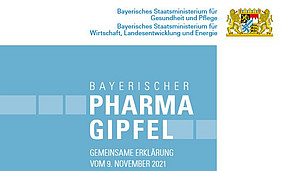Bavaria's Minister of Health Klaus Holetschek and State Secretary of Economic Affairs Roland Weigert want to strengthen Bavaria as a pharmaceutical location and improve the framework conditions for safe pharmaceutical care. The two politicians signed a paper to this effect in Martinsried. This provides for a large number of very specific measures, including the strengthening of patent protection and simplification of administrative processes, as well as an opt-out model for the use of data from the electronic patient record (ePA) for research purposes.
The measures in the Joint Declaration of the Bavarian Pharmagipfel, which has now been updated, must now be implemented at the federal level, because spending on medicines is an investment in health. Signatories on the part of the pharmaceutical associations are the Bundesverband der Arzneimittelhersteller e.V. (B.A.H), the Biotechnology Industry Organization Germany e.V. (BIO Deutschland), the Bavarian regional association of the German Pharmaceutical Industry Association. (BPI), Pro Generika e.V. and the Association of Research-Based Pharmaceutical Companies e.V. (vfa).
Specifically, the politicians and pharmaceutical associations advocate the following measures:
- Strengthening patent protection
- Simplification of administrative processes
- Use of health data for research & development
- Improving framework conditions for advanced therapies
- Joining forces in the fight against cancer
State Secretary Roland Weigert commented: "We must continue to strengthen our pharmaceutical industry. The challenges in research and production are great. The pandemic has shown this once again. Decisive action by the future German government is now also essential. We need suitable framework conditions for an innovative and resilient pharmaceutical industry. Particularly important are the preservation of patent protection as an incentive for innovation and improvements in the framework conditions for clinical research, which is hampered by excessive bureaucracy. We will develop further proposals on clinical research in a working group."
Bavaria's Minister of Health Klaus Holetschek emphasized, "The Corona pandemic has impressively shown how important a stable supply of high-quality and innovative medicines is. We will continue to work hard to achieve this: Rapid access for patients to both innovative therapies and established medicines must continue to be guaranteed in the future. The Joint Declaration therefore contains concrete proposals for increasing supply security. At the same time, we have our sights set on research: To improve it, we need the broadest possible basis of health data. Because it is clear that the more we know, the better therapies can be developed. The Joint Declaration therefore proposes an opt-out model: Data from the electronic patient record (ePA) should be able to be used for research purposes - unless the patient decides not to use the ePA or to delete the data. So the insured should clearly continue to have their data in their own hands."
From the point of view of the research-based pharmaceutical companies, Chantal Friebertshäuser, Chairwoman of the Board of Management of MSD Sharp & Dohme GmbH as State Representative of the vfa, emphasized: "Now is the time to specifically create sustainable structures to improve patient care and to strengthen Bavaria as a pharmaceutical location for the future. This also includes the generally demanded provision of pseudonymized patient data and evaluation also by means of artificial intelligence for research purposes."
Oliver Kirst, Managing Director of Servier Deutschland GmbH and Chairman of the BPI Bavarian State Association, commented: "The standardized transfer of health data from the electronic patient record to the research data center would enable more well-founded health care research and thus provide valuable insights for even better health care."
Dr. Peter Heinrich, managing director of Sinfonie Life Science Management GmbH and board member of BIO Deutschland, agreed, adding, "To ensure that our companies remain at the forefront of international competition, we now urgently need to advance digitization in medicine and, above all, enable researchers from industry to access health data, naturally in compliance with European data protection directives. Only in this way can we achieve the goal of personalized medicine for the benefit of patients."
The aspect of the supply of prescription as well as over-the-counter medicines was emphasized by BAH Chairman Jörg Wieczorek, Managing Director of Hermes Arzneimittel GmbH: "In order to ensure a safe and reliable supply of medicines in the future as well, adjustments are needed, particularly in the social law control instruments, such as multiple allocation in discount agreements, an expiry of the price moratorium and a waiver of the substitution of biologics in pharmacies. This would urgently require a reduction in bureaucracy."
Wolfgang Späth, Chairman of Hexal AG and Chairman of the Board of Pro Generika, also addressed the issue of drug supply: "The stability of supply is one of the most pressing pharmaceutical issues of our time. This was also confirmed by the Bavarian Pharmaceutical Summit. Through COVID-19, we have all learned how much medicines matter in a crisis and how fragile our supply can be. Only a modification of the rebate contracts can counteract this. One result of the summit was that it should no longer be just about the cheapest price. Criteria in favor of greater supply security must also be taken into account. With regard to biologics, the pandemic should also be a lesson to us. Because here, with automatic substitution, policymakers are introducing the very instrument that destabilized the supply of generics. We therefore expressly welcome the call to review this step once again."
Under the moderation of BioM, the exchange between the bodies involved in clinical research in companies and (university) hospitals is to be supported in further working meetings within the framework of a new edition of the "Clinical Research" Round Table. The aim here is to identify and implement further improvement measures.
Further information:


